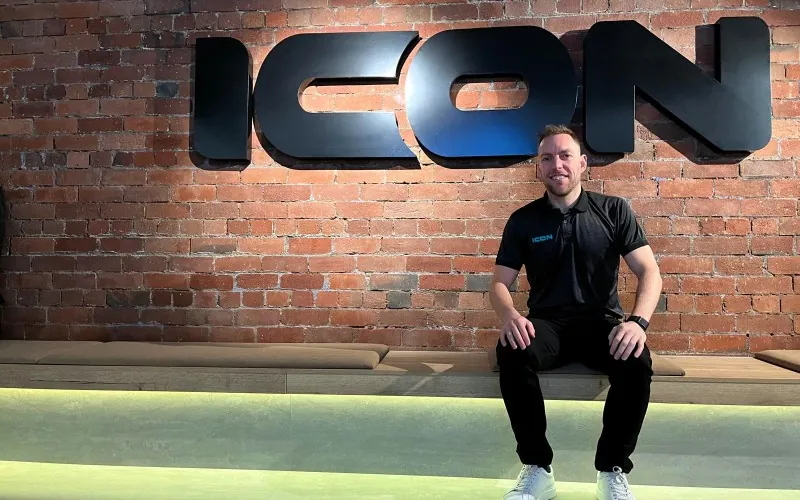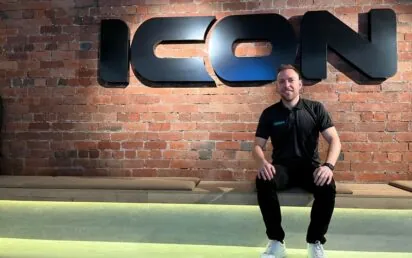For a business based next door to a fireworks shop, Icon Sports is itself putting on quite a show for the Greater Manchester town of Rochdale.
The business supplies more than three million items of bespoke teamwear and custom sports apparel across the UK and Europe annually. Customers range from grassroots sports clubs to elite athletes, governing bodies and business organisations.
Straight-talking co-owner Will Purser had early ambitions to become a cricketer and spent two injury-hit seasons with Lancashire before focusing on his entrepreneurial career. The medium-pace bowler, now a member of the England over-40s side, has captained Icon to a turnover in the millions in the decade since launch.
He first joined the family business – an agricultural merchant in Heywood – which subsequently evolved until its sole focus became selling fertiliser and grass seed into sports clubs. By now a professional with Baxenden Cricket Club in Accrington – buying his own branded bats, pads and gloves – he set up a print machine and heat press and started printing clothes.
“My idea was to go into the customers that we were already supplying for the sports ground products, and to sell them kits as well,” Purser tells BusinessCloud.
The business added workwear to its product set and within two years was turning over £120,000, with Purser “working on my own in a portakabin”. Realising it had hit a ceiling, he sold the goodwill of the business and joined the acquiring factory and engineering supplies company to manage and professionalise its clothing department.
Creating an Icon
Within two years he was keen to work for himself again and so set up Icon with fellow director Greg Tattersall – whom he knew from school and the cricket field – initially as the UK franchise and distributor of an Australian company.
“We worked out of a garage for three years. One day a load of snow slid off the roof and blocked the door; we had to melt it from the inside with a gas heater so we could escape!” he recounts.
Deciding to produce their own merchandise, they moved to Rochdale FC and built the business steadily from there. Today, with a total workforce of 13, it supplies teams and organisations across cricket, football, netball, rugby, hockey and many other sports with kit and equipment, as well as businesses.
“It’s not an off-the-shelf product: our kit is made to order,” explains Purser. “Once we’ve agreed the design with them, we will then host an online store and allow individuals within that organisation to buy what they need directly.
“Club committee people don’t want to be wasting their time dealing with taking orders and chasing. A volunteer organisation has enough to worry about without that, so we take that headache away from them and deal directly with the customer.”
Waiting game
Icon hosts around 400 club shops on its site. One of its USPs is that there is no minimum order on the bespoke garments it produces.
“There is a five-to-six-week lead time on bespoke clothing,” he acknowledges. “Some companies will promote that they do kits in 10-14 days, but in reality, if it’s not in stock, there’s nothing they can do about that so the customer might be kept waiting for three months.
“With us, it’s never in stock – so it’s never out of stock.”
ICON Sports showroom
We’re speaking to Purser in Icon’s boardroom, part of a development which cost “in the six figures” inside that industrial warehouse next door to the fireworks shop.
“We always had a vision of a larger premises. We saved up a lot of money from sales – we never borrowed any – and reinvested,” says Purser.
“We’re confident that we’ve got one of the best showrooms in the North West – if not further afield – which will aid our growth. Customers and potential customers are now coming to us, rather than the other way around.”
Enter the tech
Technology has been central to the business, from programs for designing kits and uploading the final files for manufacture to identifying sales opportunities on Facebook and keeping customers updated on the status of their orders.
The next steps it takes in this area could be truly cutting-edge. “We’re in talks about adding a 3D scanner where you would take a picture of yourself, using a mobile device, and it would scan your body shape and register your sizes,” he explains.
“When you’re shopping on our website, a widget would then pop up suggesting the recommended size for you based on the garment type.”
This could be a game-changer when it comes to converting sales, as bespoke garments by their nature are non-refundable.
“Previously, we would have to send samples out to customers; ask them to come in and try them on; or travel out to do a club night for 100 people at once,” Purser continues. “That could be anywhere in the country – so for two people to go to one of these, cost-wise it’s not sustainable.
“There’s a delay process and it takes more time and effort to actually convert a sale.
“Being a brand that people aren’t familiar with is one of the barriers to people buying. If they’re buying a Nike top, for example, they will know what size they wear in Nike; likewise in Adidas.
“But they’ve not experienced us before and they want the confidence to buy.”
Going pro
Could the organic growth lower down the sporting pyramid be complemented with professional clubs?
“We’ve tendered for a few professional clubs across different sports,” answers Purser, “but that will need financial investment because of the way the deals are structured.
“A cricket club we looked at was asking for a £75,000 gift of kit up front: you’d hope to get that back over the duration of the agreement, but we’re not in a financial position to do that without borrowing money. So there’s a bit of risk involved there.
“However, if you look at it on a grander scale, securing a larger club or organisation should naturally bring organic growth because grassroots clubs would see that and come to us.
“It’s a totally different way of working: they’d also be on extended payment terms, which creates cash flow issues because you’ve got to buy all the kit. You’ve got to give them all the kit, but you’re not getting paid for it!”
Ascend
Icon is part of the first cohort for GM Business Growth Hub’s Ascend Scale Up Programme, a personal development initiative tailored to help founders of high-growth businesses across Greater Manchester to scale rapidly and achieve their full potential.
Delivered in partnership with KPMG over six months, Ascend provides expert mentorship, co-working access in Manchester city centre and valuable industry exposure.
“It’s a brilliant opportunity, from tapping into the experience of the other businesses to the support from KPMG and GM Business Growth Hub,” says Purser.
“They want growing Manchester businesses to do well and provide a platform for them to be the best that they can be in their particular environment.”


